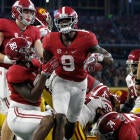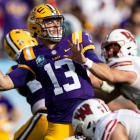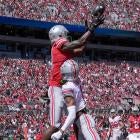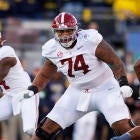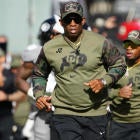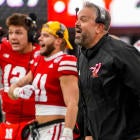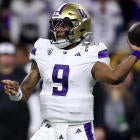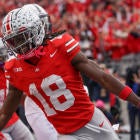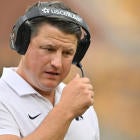While the annual "who's playing quarterback at Alabama" guessing game lingered all summer, Crimson Tide radio analyst Phil Savage cautioned that the questions on offense didn't hinge simply on that position.
"People are missing the point that, for the first time in the decade of Nick Saban's time in Tuscaloosa, they're having to replace the center, the tailback and the quarterback all in conjunction with each other," said Savage, a former NFL general manager. "That's a challenge when you subscribe to the philosophy of being strong down the middle."
Last week, Alabama rushed for just 3.2 yards per carry against Western Kentucky. It marked the Crimson Tide's third-lowest rushing average under Saban against a non-Power Five team, surpassed only by Colorado State in 2013 (3.1 yards) and Utah in 2008 (0.9). The 2008 and 2013 seasons happen to be two of the three years Saban didn't win the national title or reach the College Football Playoff over the past eight years.
Alabama is averaging 4.4 yards per carry through two games (72nd in the country). That's significantly down from the first two games in previous seasons during the Lane Kiffin era (6.0 yards in 2015 and 5.9 yards in 2014). Mark Ingram, Alabama's 2009 Heisman Trophy winner, even took to Twitter to express surprise at what he saw last week.
Bama really a spread offense now. What run game?!! 😔
— Mark Ingram II (@MarkIngram22) September 10, 2016
As concerns go in college football, Alabama's running game issues may turn out to be first-world problems. This is still a deeply talented team with what appears to be a loaded defense.
Still, as Alabama prepares to face on Saturday the only SEC team it lost to in each of the past two years (Ole Miss), the narrative that it's Alabama and everyone else nationally isn't a given. It's often assumed the Crimson Tide will figure out their offense along the way -- and with good reason given the track records of Saban and Kiffin. But the biggest restructuring of Alabama's offense under Saban must still actually play out.
Saban, who has strongly criticized his team despite the first two blowout wins, attributed the running game problems to poor execution and Western Kentucky loading the box.
"But if we block them right, we should have four- and five-yard runs," Saban said. "If we get movement, if we have the right placement, if we step the right direction, those are all things I'm talking about that we need to do better."
None of this conversation is sexy to the average fan, but Saban sweats the small stuff so much that he gave Kiffin an "ass chewing" near the end of Alabama's 38-10 victory over Western Kentucky. The pieces are all so new on Alabama's offense up the middle.
The quarterback is a talented true freshman, Jalen Hurts, who can create some running yards with his legs. He's the first Alabama true freshman to start at quarterback in 32 years.
Yet in the past 20 years, no SEC team has won the league with a true freshman taking snaps. Tennessee's Erik Ainge (2004) is the only true freshman quarterback to win an SEC division over that period.
The running backs are new: Bo Scarbrough (the between-the-tackles back) and Damien Harris (the slasher). For the first time under Saban, Alabama did not return an experienced back. Almost a decade ago, Glen Coffee turned over the running back mantle to Ingram, who handed it off to Trent Richardson, who passed it down to Eddie Lacy, who gave it to T.J. Yeldon, who crowned Derrick Henry, who had no one as his obvious successor since Kenyan Drake also left after 2015.
The offensive linemen are essentially all new starters except for left tackle Cam Robinson. Last week, Alabama's offense committed 11 penalties for 70 yards, including three false starts and two holding penalties by the offensive line/running back positions.
SEC Network analyst Cole Cueblic, a former Auburn offensive lineman, said the biggest issue he sees with Alabama's offense is the lack of continuity on the offensive line. Right tackle Jonah Williams, right guard Ross Pierschbacher, center Bradley Bozeman and left guard Lester Cotton are essentially new starters at their positions.
"I don't think the linemen themselves are on the same page," Cueblic said. "Then you've got some new backs on top of that who don't necessarily understand what the system is for them. That's the weird thing about running the football. Maybe more than any other play in football, one breakdown can completely ruin it. Now, there were a lot of breakdowns last year [for Alabama], but the dude back there [Henry] was elite."
Offensive line is a position grounded in familiarity. Linemen must be on the same page to execute combination blocks and double teams. Fewer repetitions together mean more uncertainty of what the guy next to you will do on his assignment.
"Watching the first games it really stuck out why they want Lester Cotton on the field," Cueblic said. "Does he miss a few blocks? Yes. But the kid has a boatload of power. He's raw. He's got to harness it and needs to learn not to just run people over. The same thing with Jonah Williams."
Savage said he noticed Hurts often getting moved off his passing spot on inside rushes, meaning Alabama's center and two guards need to improve their communication. Gone from Alabama is Ryan Kelly, a three-year starter who was named college football's best center in 2015.
"The Indianapolis Colts are paying Andrew Luck almost $25 million, and they thought so much of Ryan, they took him in the first round to be his personal protector," Savage said. "Ryan is the most difficult player for Alabama to replace."
Alabama could find ways to get running yards differently in 2016 to create offensive balance. By going with Hurts, Saban may be acknowledging Alabama doesn't have an elite running back this year so it needs to steal some yards on zone reads, sprint outs and bootlegs.
More so than many coaches -- hello, Les Miles -- Saban has shown he's willing to evolve from his preferred style. Alabama started using tempo and run-pass option (RPO) plays with Blake Sims at quarterback in 2014 because they fit his skills. Hurts has handled some RPOs so far with varying success due to how the plays were blocked, Saban said.
"I know that part of it is not something as a group [the media] are all necessarily interested in, but it's a fact of the matter," Saban said.
Saban criticized Alabama's performance the first two weeks despite outscoring USC and Western Kentucky by a combined 90-16. How many coaches could live with those results and with Alabama's talent? Probably almost every one of them.
But Alabama plays with different standards and isn't immune from questions. So while the public rolls its eyes at Saban's dissatisfaction in blowout wins, Savage hears and sees something different.
"I think they're still trying to figure out exactly what their calling card is going to be," he said. "It's a work in progress."












